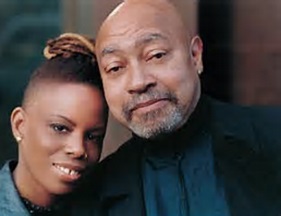No drums, no horns: Regina Carter and Kenny Barron combine for expert soft-spoken jazz
 |
| Generation gap bridged: Carter and Barron |
So it was Saturday night at the Tarkington, Center for the Performing Arts, in Carmel. The pianist and the violinist closed the generation gap effortlessly once again (he's 72, she's 49), in a trim program of pieces mainly from that recording. They respond seamlessly to each other and come up with one effective moment after another.
Carter has brought to jazz violin a sensibility deeply rooted in the blues. Her instrument is ideal for bending pitches as adeptly as the best slide guitarist, and she knows all the tricks. The violin's keening tone and variety of articulation can approach the expressive range, from plaintive to exuberant, of the classic blues singers.
Her technical adroitness matches well with Barron's crisp piano style and cornucopia of well-turned phrases. And the pianist is also well-versed in the blues, with newly minted flourishes that dependably steer away from cliches.
It was no surprise, then, that the concert opened and closed with the blues, both tunes by Thelonious Monk. "Misterioso" found Carter a bit scratchy to start things off, but the spacing of the theme in partnership with Barron came off attractively before the blues form was filled out by improvisational exchanges between the musicians.
Carter revealed a penchant for inserting brief quotes in her discourse. In "Misterioso," these included some Gershwin, some Ellington, and "Swing Low, Sweet Chariot." In the next number, "Softly, As in a Morning Sunrise," a nearly 90-year-old Sigmund Romberg tune restored to its tango pulse in this version, the violinist tucked in smidgens of "Flight of the Bumblebee" and the perky trumpet tune from "Petrouchka."
The duo gave Gershwin full measure in a bluesy, mid-tempo interpretation of Gershwin's "Oh Lady Be Good" to bring the concert up to intermission. They were thoroughly inspired by this point, having just come out of the etude-like thickets of a Barron original called "What If." This was nicely positioned after an ethereal ballad, also by Barron, called "A Flower." Both were among the six pieces available on "Freefall." Another was a buoyant rendition of Johnny Hodges' "Squatty Roo."
The concert's second half opened with a deep-delving interpretation of the Billie Holiday song "Don't Explain." The performance featured a complex solo cadenza by Carter that tucked in a paraphrase of cross-strings figuration from Arvo Part's "Fratres." I found the adventurousness of this arrangement more to the point than the wallowing, unfocused account Barron and Carter gave of Wayne Shorter's "Footprints." That jazz standard is also subject to puzzling overextension on "Freefall," where it's the only one of the 10 tracks that doesn't make sense to me.
The concert closed with another classic from that monstre sacre of jazz piano, the self-explanatory "Monk's Blues." The energizing mutual regard of the two musicians ensured a fresh interpretation of the bedrock form of so much American music. The Tarkington audience was sent out into the snowy cold with memories of a rare meeting of minds that was also a meeting of old souls.



Comments
Post a Comment